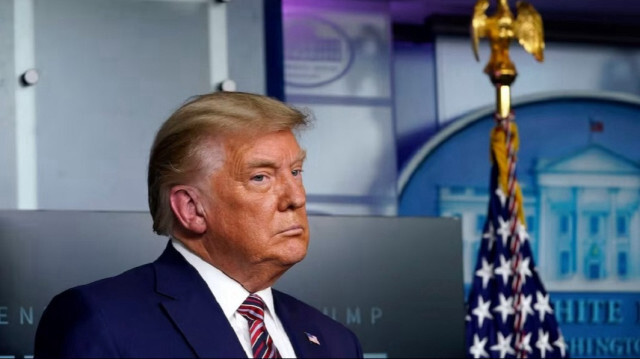
Trump's victory should not surprise anyone who objectively evaluates what has occurred in American politics over the past 10 years
- Possibly the most striking aspect of his victory speech was that Trump never mentioned the Republican Party. He treats his campaign as something different from the party he runs under
ISTANBUL (AA) - Hollywood films feature this sort of redemption plot. Eight years after his shocking victory over Democratic candidate Hillary Clinton, and four years after being edged out by Joe Biden in a result that he never recognized, America's voters have given the keys to 1600 Pennsylvania Avenue back to Donald J. Trump. And this time he even won the popular vote by a considerable margin.
- Polls again misled
The past eight political years taught this observer one rule of thumb: add three or four percentage points to polls claiming to analyze Trump's support among U.S. voters. For that reason, and given the close polling numbers in almost all of the states declared "swing states" in this election cycle, predicting that Trump would eventually emerge victorious was not difficult.
This is the third straight election for which polls dramatically underestimated Trump's performance. As in 2016 and 2020, public opinion surveys were skewed towards the Democratic Party candidate. Magical thinking once again dominated essentially all media outlets supporting Democratic presidential candidate Kamala Harris. Once again the result was long faces on left-leaning MSNBC, ominous headlines from the New York Times, and another round of Democratic Party supporters googling "most livable foreign countries."
- 2020 a Pyrrhic victory for Democrats
Trump's victory should not surprise anyone who objectively evaluates what has occurred in American politics over the past 10 years. The most important factor is that the Democratic Party failed to learn any lessons from 2016, and did not realize that 2020 was a Pyrrhic victory. In fact, if Biden had lost, it probably would have been better for the Democratic Party because they would have been forced into serious self-analysis, and to carry out internal reform in terms of both platform and personnel.
But winning in 2020 enabled the Democrats to see 2016 as an outlier, an aberration, and to adopt a "stay the course" mentality. The scenes at the 2024 Democratic Convention, where the Clintons, the Obamas, and the Bidens all took center stage, indicated clearly that the Democrats were blind to the situation's realities. That led to Tuesday's definitive defeat.
- Trump's victory speech: A MAGA victory, not a Republican one
Early Wednesday morning, Trump took the stage to embrace his base once his victories in North Carolina and Pennsylvania were assured. Trump spoke as he always does, almost exclusively in hyperboles and superlatives, repetitively, and with frequent non sequiturs. [1] Despite his teleprompter, Trump always improvises, saying whatever comes to his mind, but completely in the moment and focused on his immediate audience.
Possibly the most striking aspect of his 25-minute victory speech was that he never mentioned the Republican Party. He refers to his campaign as a political movement, and treats it as something different from the party for which he runs as candidate. For example, Trump took a moment to list the Senate races that the Republicans won, but credited it to the "MAGA [2] Movement," not to the Republican Party.
Trump also thanked the "record numbers" of voters that turned out to support him in order to "regain control of their country," and emphasized the width of his coalition, naming a variety of minorities, including Latinos, Arab Americans, and Muslim Americans, as groups that supported him.
Although official vote tallies will not be finalized for several days, Trump will probably end up receiving fewer votes in this election than he did in 2020. Harris also will receive more than 10 million fewer votes than Biden did in 2020. Even though the number of eligible voters grew in the past four years, turnout in this election seems to have declined precipitously.
- Trump's victory speech: A ‘mission from God' to ‘restore America to greatness'
Most of Trump's speech was devoted to meandering comments about his team and what he will do in the next four years. He briefly touched on plans to exploit natural resources and to reduce taxes and the national debt. He spent two minutes on his relationship with Elon Musk, during which he claimed to not know what the Starlink satellite internet service was until he asked Musk about it. Trump also asserted that he would stop wars, not start them.
Eventually, Trump also got around to the assassination attempt this July in Pennsylvania, saying that people told him: "God spared my life for a reason … to save our country and to restore America to greatness." He went on to characterize his cause as a "noble and righteous endeavor."
In the end, though, Trump's speeches are always light on content and details, and mostly devoted to flashy talking points. The projected image, not the actual message, is what is important. So in order to understand what is in store for America, and for the world, during the next four years, we will have to wait and observe developments. Trump will be inaugurated as the 47th U.S. president on Jan. 20, 2025.
[1] https://www.youtube.com/watch?v=WI9fbbQ-aTo
[2] This acronym comes from the phrase "Make America Great Again," which was the slogan for Trump's 2016 campaign.
*The author holds a master's and PhD in history from Istanbul's Sabanci University, where he taught Turkish history for nine years.

